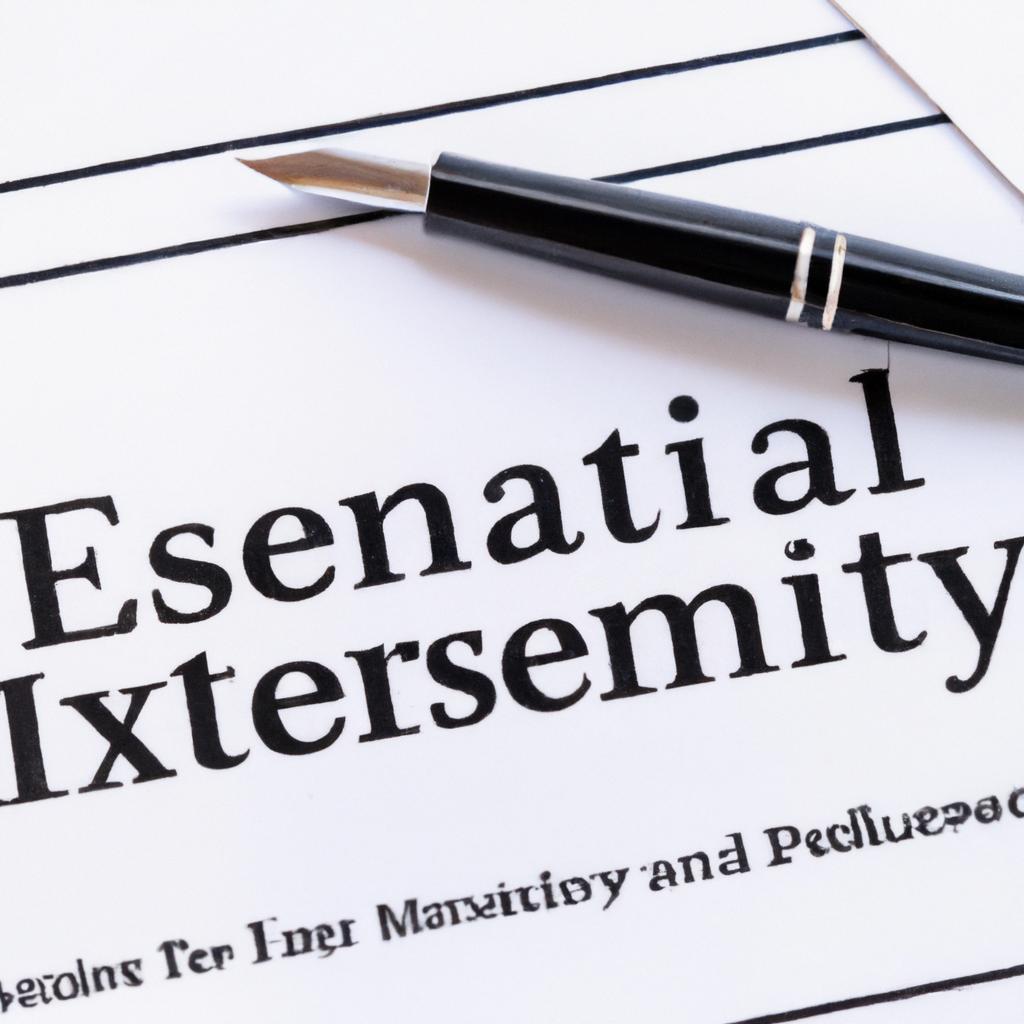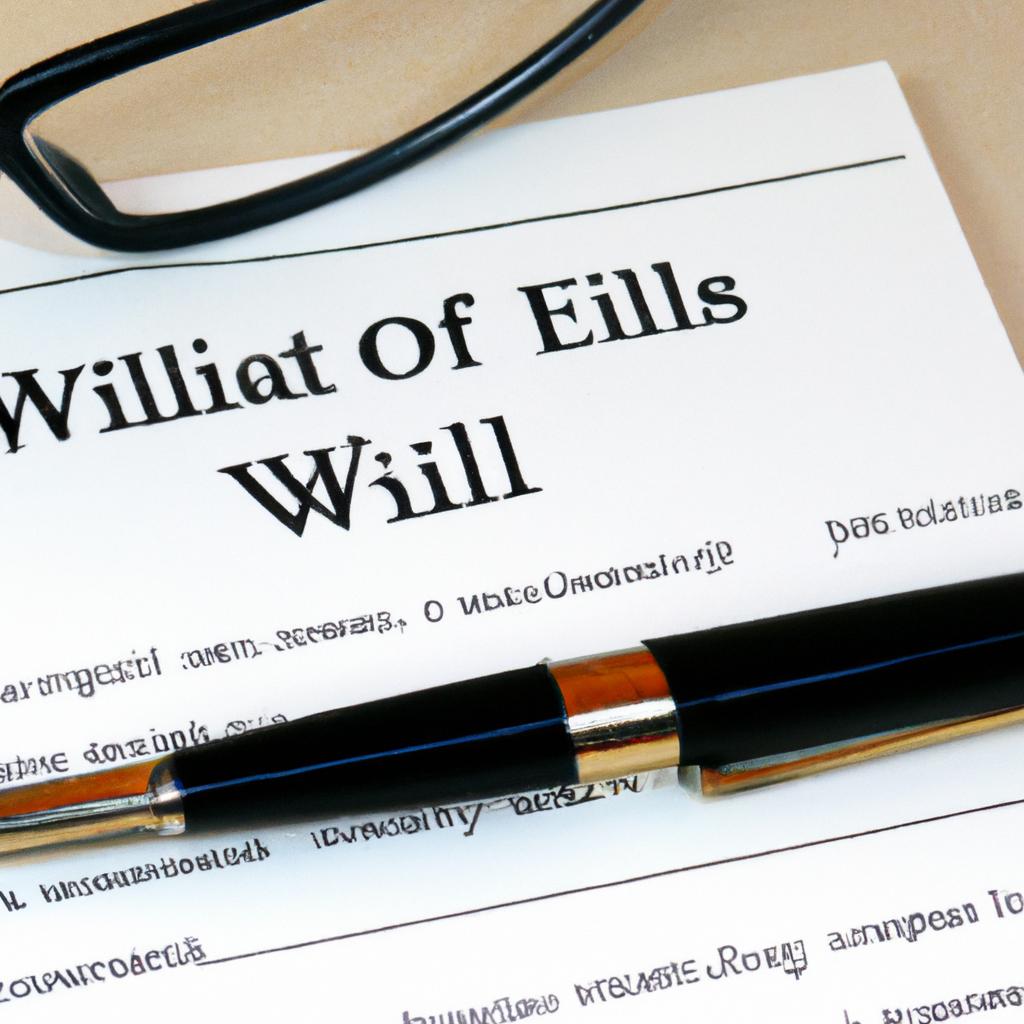In the intricate tapestry of estate planning, there exists a vital document that serves as the cornerstone of one’s final wishes and legacy – the last will and testament. Crafting a comprehensive and legally sound will is a crucial step in safeguarding one’s assets and ensuring that loved ones are provided for according to their wishes. To embark on this pivotal journey of testamentary planning, one must first understand the essential components required to make a will. Join us at Morgan Legal Group, a distinguished law firm nestled in the heart of New York City, as we guide you through the necessary steps and considerations in creating a will that withstands the test of time.
Key Components of a Valid Will
In a valid will, there are several key components that must be carefully considered and included. These components are essential for ensuring that your final wishes are carried out effectively and legally:
<ul>
<li><strong>Identification of the Testator:</strong> The will must clearly identify the person creating the will (the testator) and confirm that they have the mental capacity to make decisions.</li>
<li><strong>Appointment of an Executor:</strong> The will should appoint an executor who will be responsible for managing the testator's estate and ensuring that their wishes are carried out.</li>
<li><strong>Specific Bequests:</strong> The will should outline specific gifts or bequests that the testator wishes to leave to certain individuals or organizations.</li>
</ul>Additionally, a valid will should also include provisions for any remaining assets (residuary estate), as well as contingencies in case certain beneficiaries predecease the testator. It is crucial to seek legal advice from a qualified estate planning attorney to ensure that your will complies with the relevant laws and regulations.
<table class="wp-block-table">
<thead>
<tr>
<th>Key Components</th>
<th>Description</th>
</tr>
</thead>
<tbody>
<tr>
<td>Identification</td>
<td>Clearly identify the testator and confirm mental capacity.</td>
</tr>
<tr>
<td>Executor</td>
<td>Appoint an executor to manage the estate.</td>
</tr>
</tbody>
</table>
Essential Information to Include in Your Will
When creating a will, it is crucial to include essential information to ensure that your wishes are carried out accurately. This information can vary depending on your individual circumstances, but some key elements to include in your will are:
- Executor: Appoint someone trustworthy and responsible to carry out your wishes and handle the distribution of your assets.
- Beneficiaries: Clearly outline who will inherit your assets, including specific bequests if applicable.
- Guardianship: If you have minor children, designate a guardian to care for them in the event of your passing.
Additionally, it is important to include details about your assets, debts, and any special instructions or wishes you may have. Consult with an experienced estate planning attorney like Morgan Legal Group in New York City to ensure that your will is comprehensive and legally sound.

Crucial Steps in Executing a Will
When it comes to executing a will, there are several crucial steps that need to be followed in order to ensure that your wishes are carried out effectively. One of the first things you will need to do is gather all of the necessary information and documentation. This includes a list of all of your assets, debts, and beneficiaries. You will also need to have a clear understanding of how you want your assets to be distributed and who you want to be in charge of carrying out your wishes.
Once you have gathered all of the necessary information, the next step is to draft your will. This document should clearly outline your wishes and include details about how your assets should be distributed. It is crucial to work with a knowledgeable attorney who specializes in estate planning to ensure that your will is legally sound and will hold up in court. After your will has been drafted, it is important to regularly review and update it as needed to reflect any changes in your assets or family situation.

Expert Recommendations for Creating a Comprehensive Will
When creating a comprehensive will, it is important to consider all aspects of your assets, debts, and beneficiaries. To ensure that your wishes are carried out smoothly after your passing, expert recommendations include the following:
- List all of your assets and debts: Make a detailed list of your bank accounts, investments, real estate, personal property, and any outstanding debts.
- Choose an executor: Select a trustworthy individual who will be responsible for carrying out the provisions of your will and managing your estate.
- Designate beneficiaries: Clearly outline who will inherit your assets and specify any conditions or restrictions.
| Asset Type | Beneficiary |
|---|---|
| Bank Account | John Doe |
| Real Estate | Jane Smith |
Additionally, seek legal advice from a qualified attorney to ensure that your will is legally sound and properly executed. Consider including provisions for guardianship of minor children, setting up trusts for beneficiaries, and addressing any tax implications of your estate.
Q&A
Q: What exactly is a will?
A: A will is a legal document that outlines your final wishes for how you want your assets to be distributed after your passing.
Q: What are the basic requirements for creating a will?
A: The basic requirements for creating a will include being of sound mind, being at least 18 years old, and having witnesses present when signing the document.
Q: What important information should be included in a will?
A: Important information to include in a will typically consists of a list of your assets, the beneficiaries who will receive these assets, and an executor who will be responsible for carrying out your wishes.
Q: Is it necessary to have a lawyer draft a will?
A: While it is not necessary to have a lawyer draft a will, seeking legal advice can ensure that your will is drafted correctly and is legally binding.
Q: Can a will be updated or changed?
A: Yes, a will can be updated or changed at any time as long as the individual is of sound mind. It is recommended to review and update your will periodically to reflect any changes in your circumstances.
Q: What happens if someone passes away without a will?
A: If someone passes away without a will, their assets will be distributed according to the laws of intestacy in their state, which may not align with their wishes. It is important to have a will in place to ensure that your assets are distributed according to your desires.
To Wrap It Up
In conclusion, creating a will is a crucial step in planning for the future and ensuring your wishes are carried out after you’re gone. By gathering the necessary documents, naming your beneficiaries, and selecting an executor, you can make the process easier for your loved ones and provide them with peace of mind. Make sure to review and update your will regularly to reflect any changes in your circumstances. Remember, preparing a will is not just about distributing your assets, but also about leaving a lasting legacy for generations to come. So, take the necessary steps today to secure your legacy tomorrow.
 Making a will is an essential part of estate planning and ensures that your wishes for your assets, property, and loved ones are carried out after your passing. Yet, many people put off creating a will, either because they don’t think they need one or because they find the process daunting. However, creating a will doesn’t have to be complicated or intimidating. In this article, we’ll walk through everything you need to make a will and why it’s a crucial step in planning for your future.
Making a will is an essential part of estate planning and ensures that your wishes for your assets, property, and loved ones are carried out after your passing. Yet, many people put off creating a will, either because they don’t think they need one or because they find the process daunting. However, creating a will doesn’t have to be complicated or intimidating. In this article, we’ll walk through everything you need to make a will and why it’s a crucial step in planning for your future.
Why Do You Need a Will?
Before diving into the specific elements required for creating a will, let’s first discuss why having one is so important. A will is a legally binding document that outlines your wishes for your property and assets after you pass away. Without a will, your assets and property could be distributed according to your state’s laws, which may not align with your wishes.
Creating a will can also help avoid potential conflicts and confusion among your loved ones. It ensures that your property and assets are distributed precisely as you intended, reducing the risk of disputes and legal battles among family members.
Furthermore, a will can also provide peace of mind for you and your loved ones. Knowing that you have a plan in place can alleviate stress and uncertainty, allowing you to focus on enjoying your time with your loved ones.
What Do You Need to Make a Will?
Now that we’ve established the importance of having a will, let’s discuss what you need to make one.
1. Legal Capacity
The first requirement for creating a will is to have legal capacity. This means that you must be of sound mind, meaning you are mentally competent and understand the significance and consequences of creating a will. If you have a cognitive impairment or mental illness, you may need to seek legal advice to determine your eligibility to make a will.
2. Personal Details
Your will should include your personal information, such as your full name, date of birth, and current address. It’s also essential to include relevant identifying information, such as your social security number or driver’s license number.
3. Beneficiaries
A beneficiary is a person or organization that you designate to inherit your assets and property after your passing. Your beneficiaries can include family members, friends, or charitable organizations. It’s crucial to be specific and provide their full names, addresses, and relationship to you. If you wish to leave specific assets to individuals, such as family heirlooms or sentimental items, you should also outline this in your will.
4. Executor
An executor is a person responsible for administering your will and ensuring your wishes are carried out. It’s essential to choose someone you trust and who is willing and capable of carrying out this role. Your executor should also be included in your will, including their full name and contact information.
5. Guardianship for Minor Children
If you have minor children, your will can also designate a legal guardian who will take care of them in the event of your passing. This is an incredibly crucial aspect of creating a will, as it ensures your children are taken care of by someone you trust.
6. Assets and Property
Your will should outline all of your assets and property, including information such as property addresses, bank accounts, investments, and insurance policies. Be as thorough and specific as possible, as this will help avoid any confusion or disputes among your beneficiaries.
7. Witnesses and Notary
Most states require that a will is witnessed and notarized to be considered legally valid. The number of witnesses required varies by state, but typically it’s two or three. It’s essential to check your state’s laws to ensure you follow the correct procedures.
8. Update Your Will Regularly
Life is constantly changing, and so are your assets, relationships, and wishes. Therefore, it’s essential to update your will regularly, especially after significant life events such as marriage, divorce, or the birth of children. It’s also a good idea to review and update your will every 3-5 years to ensure it accurately reflects your current wishes.
Practical Tips for Creating a Will
Now that you know what you need to make a will let’s discuss some practical tips to make the process smoother.
1. Consult with a Lawyer
It’s always a good idea to seek professional advice when creating a will. A lawyer can ensure that your will is legally valid and can offer guidance on any questions or concerns you may have.
2. Consider a Living Will
A living will is a separate document that outlines your wishes for medical treatments and end-of-life care. It can provide direction for your loved ones during difficult times and ensure your wishes are carried out if you are unable to make decisions for yourself.
3. Keep Your Will in a Safe Place
After creating your will, make sure to keep it in a safe place, such as a fireproof safe or a safety deposit box. It’s also a good idea to communicate the location of your will with your executor or a trusted family member.
In Conclusion
Creating a will may seem overwhelming at first, but with the right information and resources, it can be a straightforward process. By including all of the necessary elements and following proper procedures, you can ensure that your wishes are carried out and your loved ones are taken care of after your passing. Remember to regularly review and update your will as needed and seek professional advice if you have any concerns.


